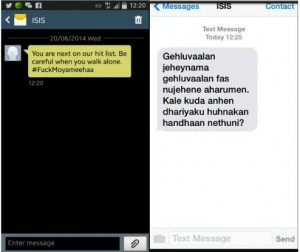Police used disproportionate force against demonstrators during street protests in the aftermath of the transfer of power in February 2012, states the Human Rights Commission of Maldives’ (HRCM) Universal Period Review (UPR) report.
“HRCM observed during dispersal of demonstrations [Maldives Police Service] used disproportionate force which was at times discriminatory towards political parties, excessive and disproportionate use of pepper spray at protestors, inconsistency in issuing warnings before dispersal and obstruction of media,” reads the report.
“It was evident that some demonstrators were subjected to torture at the time of arrest.”
In June 2012, the Maldives Police Service (MPS) denied allegations of police brutality by Amnesty International, which had condemned the “excessive use of force” against demonstrators.
Amnesty’s statement followed its investigation of a police crackdown on a Maldivian Democratic Party (MDP) protest against the dismantling of the opposition party’s Usfasgandu protest camp on May 29 – a crackdown which included “beatings, pepper-spraying, and arrests”.
“Those attacked include peaceful demonstrators, members of parliament, journalists and bystanders,” said Amnesty.
The HRCM meanwhile recommended “action against officers who violate the laws, eliminating room for impunity.”
Last month, Attorney General Mohamed Anil told parliament that five police brutality cases from February 2012 were ongoing at court.
While it had concluded that the transfer of presidential power was constitutional, the Commonwealth-backed Commission of National Inquiry had found that “there were acts of police brutality on 6, 7 and 8 February 2012 that must be investigated and pursued further by the relevant authorities.”
Anil explained that the Police Integrity Commission (PIC) had investigated 45 cases of alleged police brutality and made a recommendation to the home ministry to dismiss six police officers.
After the ministry instructed police to take disciplinary action against the officers, the police disciplinary board sacked one officer.
However, the disciplinary board decided there was insufficient evidence to prove wrongdoing by the other five officers and decided not to dismiss them pending the outcome of a trial.
On February 8, 2012, thousands of MDP supporters took to the streets of Malé in a protest march after former President Mohamed Nasheed declared his resignation the previous day had come “under duress” in a “coup d’etat” instigated by mutinying police officers of the Special Operations (SO).
Following an investigation, the HRCM concluded that the heavy-handed police crackdown on the MDP walk was “brutal” and “without warning.”
Torture and prisons
The HRCM revealed in the UPR report that a total of 304 torture allegations were filed at the commission, “of which 74 allegations have been investigated from 2010 to July 2014.”
“However, none of these cases were sent to prosecution due to lack of enough evidence to prove them in a court of law,” the report stated.
On pressing issues concerning the prison system, the report highlighted “the lack of categorisation, unavailability of rehabilitation and reintegration programs, unnecessary strip‐search and disproportionate disciplinary measures towards male prisoners and minors.”
“In custodials, issue of overcrowding, handcuffing for indefinite periods, extended detention for investigation purposes and failure to collate data in a systematic way are areas suggested for improvement over the years,” the report noted.
“In the only psychiatric institution of state, despite continuous recommendations for change, geriatric patients and patients enduring mental illnesses and [persons with disabilities] are accommodated without proper categorisation. Institution for children under state care is heavily under‐staffed. Inappropriate disciplinary measures against children under de facto detention persist in most institutions sheltering juveniles.”
Gang violence and juvenile justice
The HRCM also noted that gang violence and murders “increased at an alarming rate” in recent years.
“A study shows that many of these gang related violence are linked to politicians or business persons who pay gangs to carry out violent acts. Yet, state has been unsuccessful in effectively addressing this issue. So far 21 murder cases were recorded since 2010, most of which were gang related,” the report explained.
The reasons why youth join gangs include the “search of identity and protection” and unemployment, the report noted.
“With criminal records or inability to exit gang life makes it difficult for youth to find employment, rehabilitation opportunities and remain stigmatised by society,” the report stated.
“Although, human resource, rehabilitation and support programs remain limited for proper functioning of a juvenile justice system; the lack of political will along with resource constraints impacts addressing these issues.”
Referring to new regulations on enforcing death penalty, which allow minors convicted of murder to be executed once they turn 18, the HRCM called on the state to “abolish death penalty for minors.”
“The age of criminal responsibility is 15 years and minors can be held for hadd offence,” the report explained.
 (0)Dislikes
(0)Dislikes (0)
(0)